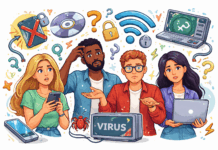Do you find yourself endlessly scrolling through your phone, even when you have more important things to do? Technology has become part of everyday life, but when screens start controlling your habits, it may be time for a digital detox. Let’s uncover the warning signs and practical solutions to restore balance in your routine.
Introduction
Technology has transformed the way we work, communicate, and even relax. While digital tools offer convenience, they also demand constant attention, draining our energy and focus. From endless notifications to mindless scrolling, digital habits often become addictive without us realizing it.
The idea of a digital detox is about consciously reducing screen use and reclaiming time for activities that truly matter. To know whether you need one, it’s essential to recognize the red flags. Below are nine strong indicators of digital overload, supported by research, along with tips to help you begin your journey toward healthier screen habits.
1. You Reach for Your Phone the Moment You Wake Up
If your morning begins with scrolling through social media or checking emails instead of stretching or reflecting, it’s a clear sign of dependency. Starting the day this way sets a reactive tone, increasing stress levels before you even leave bed. Over time, this habit prevents a calm, focused morning routine.
Did You Know? Nearly 80% of adults check their phones within 15 minutes of waking, which spikes cortisol (the stress hormone) and disrupts mental clarity for the day.
2. Difficulty Concentrating Without Checking Notifications
Do you struggle to focus for even 20 minutes without glancing at your phone? Constant notifications create a cycle of distraction, forcing the brain to multitask. This reduces attention span and lowers work performance. Overuse can also rewire brain pathways, making it harder to concentrate on tasks that require deep thinking.
Did You Know? Research suggests that it takes around 23 minutes to regain full focus after a single digital interruption.
3. Feeling Restless When Away from Your Device
If you feel anxious or irritable when separated from your phone, you may be experiencing nomophobia—the fear of being without your device. This restlessness indicates that digital use is not just a tool but a psychological dependence. Such feelings may even interfere with social gatherings, travel, or daily tasks.
Did You Know? Global surveys reveal that two-thirds of adults admit feeling anxious if their phone is out of reach, even for a short period.
4. Poor Sleep Quality
Late-night scrolling exposes the brain to blue light, which suppresses melatonin production, making it harder to fall asleep. Lack of proper rest contributes to fatigue, mood swings, and weaker immunity. Over time, bedtime phone use creates a cycle of insomnia that is difficult to break.
Did You Know? Using electronic devices two hours before sleep can delay deep rest by up to 90 minutes, reducing overall sleep quality.
5. Decline in Physical Activity
Long hours of screen time often mean sitting in the same position, leading to weight gain, stiff muscles, and poor posture. This sedentary lifestyle increases risks of heart disease, diabetes, and back pain. Many people unknowingly replace outdoor activities or exercise with digital entertainment, leading to long-term health consequences.
Did You Know? Adults spending more than six hours daily on screens are significantly more likely to experience chronic joint and spine problems.
6. Strained Relationships
If family dinners, outings, or conversations are interrupted by constant checking of phones, it can create emotional distance. Excessive digital use sends a message that online interactions matter more than in-person ones. Over time, this behavior can weaken trust and closeness in personal or professional relationships.
Did You Know? Couples who deliberately set aside device-free time report 23% higher levels of relationship satisfaction and intimacy.
7. Overwhelmed by Information
Do you feel mentally exhausted after scrolling through endless news feeds and updates? This is called information overload. With too much data, the brain struggles to filter what’s important, resulting in stress and decision fatigue. This often leads to procrastination or avoiding tasks altogether.
Did You Know? On average, people consume about 74 GB of data every day—far more than the brain can effectively process.
8. Reduced Creativity and Motivation
When every free moment is filled with browsing or gaming, the brain loses opportunities to wander, imagine, and problem-solve. True creativity often comes during quiet, distraction-free moments. Overuse of technology can drain motivation, leaving you uninspired in both personal and professional life.
Did You Know? Neuroscientists have found that daydreaming and boredom activate brain networks linked to innovative thinking and idea generation.
9. Increased Stress and Burnout
Constant emails, texts, and updates overstimulate the nervous system, keeping the body in a state of alertness. This not only raises stress but can also trigger headaches, irritability, and exhaustion. Prolonged exposure to digital stress without breaks can eventually lead to burnout.
Did You Know? People who spend more than three hours on social media daily record significantly higher cortisol levels—the body’s main stress hormone.
How to Start a Digital Detox
1. Set Clear Boundaries
Introduce rules like no devices in the bedroom or no scrolling during meals. These small changes create mindful separation from screens.
2. Schedule Device-Free Hours
Choose specific times of the day—such as mornings or evenings—when you completely disconnect. This allows your brain to reset.
3. Use Digital Wellbeing Tools
Apps like “Digital Wellbeing,” “Forest,” or “Moment” can monitor usage and remind you to take breaks.
4. Reconnect with Offline Activities
Rediscover hobbies such as painting, reading, yoga, or gardening. These activities restore balance and stimulate creativity.
5. Practice Mindful Consumption
Unfollow unnecessary accounts, turn off non-essential notifications, and consciously choose what to engage with online.
FAQs
Q1. How long should a digital detox last?
Digital detoxes vary depending on lifestyle. Some people benefit from daily screen-free hours, while others prefer weekend detoxes. The key is consistency rather than length. Even 30 minutes of device-free time can lower stress levels, improve attention span, and reset your brain for better productivity and emotional well-being.
Q2. Will a digital detox improve my sleep?
Yes. Reducing late-night screen exposure allows melatonin to function naturally, which supports deep rest. When gadgets are removed from the bedroom, sleep cycles become more stable. Studies confirm that avoiding devices before bed leads to better quality rest, higher energy levels in the morning, and reduced chances of insomnia.
Q3. Can I still use technology during a detox?
Of course. A detox is not about rejecting technology but about mindful use. Work, learning, or essential communication can continue. What changes is your relationship with leisure scrolling and unnecessary browsing. Focusing only on purposeful usage ensures balance, without cutting off access to the digital tools you genuinely need.
Q4. How can families practice a detox together?
Families can set shared rules like no phones during meals, device-free evenings, or outdoor weekend activities. This strengthens emotional connections and encourages conversations. Parents who model healthy digital boundaries also help children develop balanced habits early. Group detoxes create accountability, making it easier for everyone to stick to the routine.
Q5. What’s the first step to reducing screen time?
Begin by noticing your triggers—whether it’s social media, endless news updates, or gaming. Once identified, track your usage through apps and gradually reduce it. Simple changes like silencing notifications or leaving your phone in another room during tasks can cut distractions and help you build healthier, lasting digital habits.
Conclusion
Technology is an incredible tool, but overuse can slowly drain energy, relationships, and mental clarity. Recognizing the warning signs of digital overload is essential for protecting both physical and emotional health. By paying attention to these indicators, you can take back control of your time and focus.
A digital detox is not about giving up technology but using it with intention. By setting boundaries, rediscovering offline activities, and practicing mindful habits, you can create a healthier balance between the digital and real world—one that enhances your well-being and relationships instead of overwhelming them.









